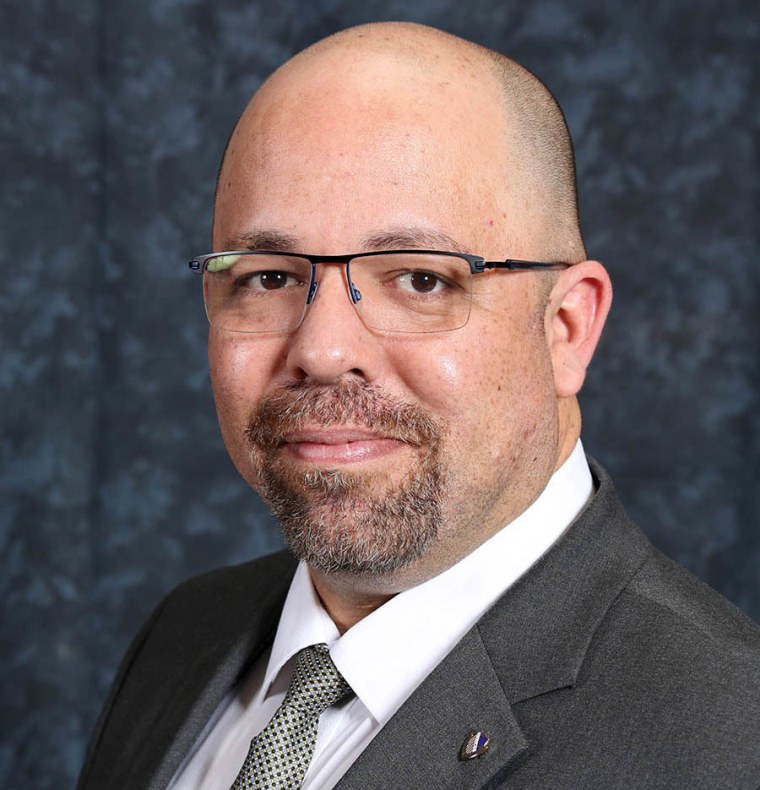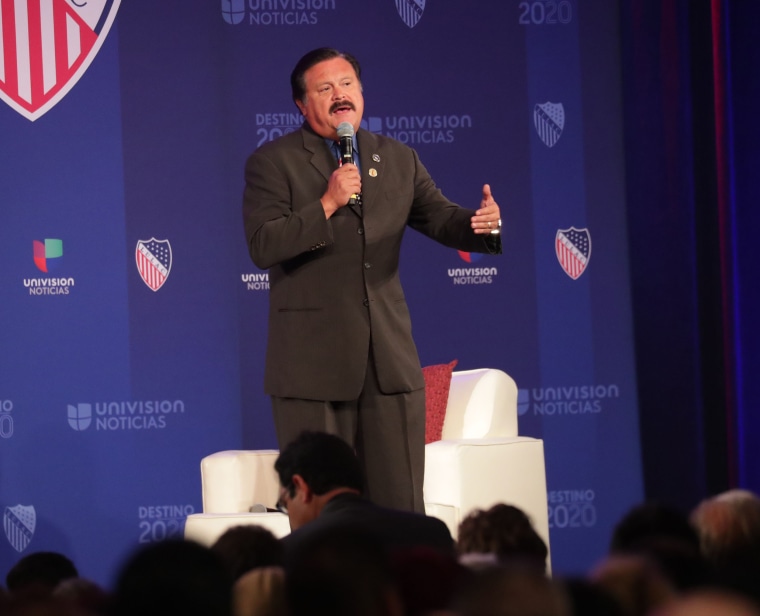Puerto Ricans have the numbers to seize control of a 93-year-old civil rights group founded by Mexican Americans in Texas, but the organization could end up in a messy legal fight over it.
The League of Latin American Citizens, established in Corpus Christi in 1929, is holding its annual conference in San Juan, Puerto Rico, this week, the group’s first in-person gathering and elections since 2019 because of Covid.
In advance of the conference, the number of councils — what the group calls its chapters — has exploded from 54 last year to at least 343, according to LULAC. That outnumbers the councils in Texas, which has been home to most of the group’s presidents elected over the years, though LULAC said it has had a similar number of councils in Puerto Rico in the 1990s.
Dallas attorney Domingo García, who is Mexican American, could very well be defeated by his challenger, Juan Carlos Lizardi, a New York resident born in Puerto Rico and son of longtime board member and Puerto Rico statehood activist Elsie Valdes.
That’s in large part because members must be at the conference in Puerto Rico to vote, which many mainland members, who tend to be older, have opted against in the midst of inflation.
David Contreras, a Houston LULAC 688 member and a group historian, said creating “paper councils” has been done in the organization for years. The paper councils are made up of people who pay the membership fee but have not been active in LULAC before signing up but can vote.
“We saw it to some extent at the Texas convention, on a smaller scale… So, they’ll bring in people to the convention to vote, people who are or have not been active in LULAC,” he said.
There have been attempts to change that, as well as the requirement for voters to attend the conference, but so far those efforts have failed.
“One of the major issues, which is voting,” Contreras said, “is coming back to bite us in the butt.”
While the prospects of a LULAC president of Puerto Rican descent is exciting to some members, the fast increase in councils has raised alarm bells and could once again throw the group’s elections into dispute.
Years of disagreement in Puerto Rico over the island’s status has led many mainland Latino groups to stay relatively neutral and limit their positions to support residents of Puerto Rico, a US territory, to decide its future. Political divisions are carved on the island largely by where support lies on Puerto Rico’s status, becoming a state, keeping the status quo or being an independent nation.
Last month, LULAC CEO Sindy Benavides said the organization was taking a stand for statehood, telling The Hill newspaper in March “the moment is now.”
However, García said later the same month that the group’s position hadn’t changed and that LULAC maintains support for the future status of Puerto Rico to be decided by its residents.
Democrats have introduced legislation calling for a federally-run election in Puerto Rico on whether the US territory should become the 51st state, an independent nation or a sovereignty with an agreement of free association with the United States. The agreement would allow the US government some authority over various governing policies.
“LULAC is a powerful group and the opportunity is that for one year or a few, it can help us,” said René Rodríguez, a professor at the University of Puerto Rico at Bayamón and an advocate of statehood. A more than 10-year member of LULAC Council 14967 in Puerto Rico, Rodríguez said he turned to his colleagues from him at the university and easily started five more councils.
Lizardi, García’s challenger, agreed that Puerto Rico is facing a historic opportunity for statehood.

“There is momentum and it’s historic and as a civil rights organization we should be there and we should be the lead,” he said, pointing out that he is not a New York resident, so he would not vote in Puerto Rico’s election.
The legislation, a compromise between conflicting bills on Puerto Rico’s status and Puerto Rican members of Congress, calls for a plebiscite Nov. 5, 2023. The prospects of the legislation, however, is uncertain.
Amid the power struggle, Latinos are trying to recover from the economic blow and educational setbacks of uncontrolled Covid. LULAC, meanwhile, has been fighting a lack of Latino representation in redistricting, pushing for immigration reform and asserting Latinos’ place in the nation’s political landscape as the Republican and the Democratic parties wage a race for more votes from the Latino electorate before the 2024 presidential election.
Contested LULAC elections have led to nasty fights in the past with allegations of voter fraud and election shenanigans, as well as lawsuits. In the early 2000s, the administration of former Puerto Rican Gov. Pedro Rosselló became a subject of investigation on whether government money was used to pay for LULAC council memberships and conference costs.

When García was elected in 2018 as president of the LULAC Institute, the nonprofit portion of the organization, the group was in the network. But it reported in 2020 a net income of $2.21 million, according to tax forms posted by ProPublica. Revenue has risen from about $3.5 million in 2018 to $5.6 million in 2020.
LULAC’s “social welfare” arm had a net income — revenue minus expenses — of $638,179 in 2020, compared to negative $8,971 net income in 2018, the tax forms posted by ProPublica show.
LULAC’s social welfare arm cannot endorse a party or candidates, but it can advocate a position on legislation. Should Democrats approve the legislation on the plebiscite, LULAC’s social welfare arm could wage a campaign to turn out voters on the plebiscite.
The group also has a nonprofit education arm, LULAC National Educational Service Centers, Inc. Lizardi is listed as vice chair and García is chair. Should Lizardi win the election, he would become chair of the nonprofit arm that reported $8.8 million in revenue in its 2019 tax report posted by Cause IQ.
Garcia said he fears LULAC’s return to financial health is at risk this election and that the way the leadership could change “could create serious problems for LULAC in the future with IRS and for our donors,” he told NBC News.
LULAC’s social welfare arm can participate in grassroots lobbying on specific legislation and partisan activity, as long as the partisan activity is not its primary purpose.
Should Democrats approve the legislation on the plebiscite, LULAC’s social welfare arm could wage a campaign to turn out voters on it and potentially on statehood.
But LULAC also may have to overhaul its boards to keep its nonprofit and advocacy arms better separated. A March 2020 memo from LULAC legal advisers to García and board members advised that insufficient separation between the nonprofit and the social welfare arm put the organization and its nonprofit’s tax exempt status at risk.
For some LULAC members, there is fear that the issue could take priority over others that the organization advocates on—immigration, voting rights, Covid and pandemic recovery and health care.
In an interview Tuesday, Benavides attributed the explosion of LULAC councils in Puerto Rico to the years of suffering from hurricanes and earthquakes. She also said she is hearing many members talk about “igualdad,” or equality.
“The conversation around civil rights and equality in Puerto Rico is always forward. That’s the conversation I always heard,” she said. “I’ve certainly heard different individuals, some not affiliated with LULAC, talk about statehood.”
The conference, she said, was sold out with the convention center at maximum capacity.
Follow NBC Latino on Facebook, Twitter and Instagram.
www.nbcnews.com
George is Digismak’s reported cum editor with 13 years of experience in Journalism